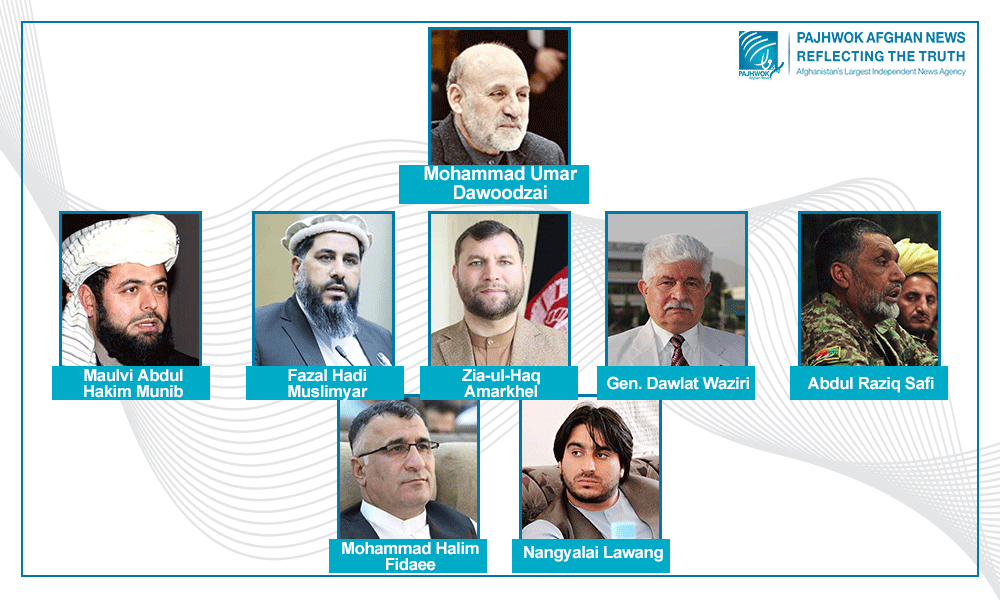KABUL (Pajhwok): Some Afghan politicians have welcomed the formation of the Reconciliation Commission, seeking more magnanimity from the government and clarity in the panel’s policy.
In March, the caretaker cabinet approved the creation of the Reconciliation Commission to establish contact with Afghan politicians in foreign countries.
The cabinet has already approved the policy of the commission, which started functioning some days back. Minister Shahabuddin Dilawar is heading the commission.
Key policy features
- Facilitating the return of all Afghan military and political personalities
- All Afghans, who opposed the Islamic Emirate in the past 20 years are beneficiaries of a general amnesty
- Nobody has the right to arrest or harass returning Afghan personalities
- Returning individuals could inform the commission about the problems they may face
- Their return is a priority. A decision on their political activities will be taken in future
- In case of need, the commission will provide them with security
- Returnees would be facilitated if they wish to work in the private sector
Views of politicians abroad
Former president Ashraf Ghani’s advisor Mohammad Umar Dawoodzai told Pajhwok Afghan News the creation of the Reconciliation Commission was a positive step taken by the acting government.
Without going into details, he said: “There is a need for more political, social and legal explanation. This may be a lengthy process needing more patience.”
Maulvi Abdul Hakim Munib, head of the Harakat-i-Enqilab-i- Islami, also welcomed the panel’s creation, saying security concerns of the Afghans living in foreign countries had been addressed to some extent.
He, however, said the future of politicians who could return to Afghanistan was not ensured. Making the reconciliation policy clear and substantive would be better, he thought.
He opined the roadmap addressed the concerns of the individuals who only wanted security and work in Afghanistan.
Nangyalai Lawang, a former Wolesi Jirga member, said the formation of this commission was a positive step for the Afghans who had fled the country.
“I went through this policy, offering assurances and amnesty to everyone. Some individuals, who are concerned about their security, should feel relieved now.”
He hoped most Afghans would return to their country with the formation of the Reconciliation Commission.
Former defence ministry spokesperson Gen. Dawlat Waziri said experience showed the government could not be run through force, . The only way forward was national unity and all Afghans should work for the reconstruction of the country, he stressed.
“The country is destroyed, people are exhausted, they are hungry — the formation of this commission is a positive step and I hail it. The panel should implement its pledges held out to political figures.”
Abdul Raziq Safi, a former general who is currently living abroad, also commended the creation of the commission and urged the government to further encourage the Afghans abroad to return home.
“Afghanistan is home to all Afghans. They must return to their country and work together for the stability of the country,” he commented.
The former general called on the caretaker government to ensure the security of returning Afghans and fulfill its promises.
Views of politicians in Afghanistan
Fazal Hadi Muslimyar, then Senate chairman, said political harmony, flexibility, unity and solidarity could resolve the existing problems and help Afghanistan move towards prosperity and progress.
He also welcomed the creation of the commission, saying the panel must provide more facilities for the Afghans in foreign countries and benefit from their experiences.
He remarked: “Afghanistan is home to all Afghans. The Islamic Emirate must establish a system representing all Afghans. The system should be run by them together. We need political interaction, dialogue, face-to-face talks. Through mutual accommodation, we can achieve stability and prosperity.”
The politicians at home urged professional figures and opponents of the government to cooperate with the commission and return to their country with honour and live there with dignity.
Zia-ul-Haq Amarkhel, former governor of Nangarhar, called the creation of the commission a good move. He said the Afghans living abroad reserved the right to live in the country and be part of the system.
He added: “Our expectations are high. The government has to show a little bit more flexibility, which means it should make clear that Afghans have the right to engage in politics and work in the system. Just making a living is not enough, because they are secure abroad.”
But Mohammad Halim Fidaee, a former governor who is currently out of the country, did not think the commission was a sincere attempt at a political settlement. He saw contradictions in the words and acts of the caretaker government.
“The creation of this commission is a trap for former politicians. If I’m wrong, then Hamid Karzai sb is in the country. Why isn’t he allowed to go abroad? Shahabuddin Delawar has clearly said the commission is not for negotiations, but paving the way for those who want to return to the country.”
According to him, the caretaker government wants to bring former officials to the country so that they could not engage in political activities in other countries.
nh/sa/mud







GET IN TOUCH
NEWSLETTER
SUGGEST A STORY
PAJHWOK MOBILE APP